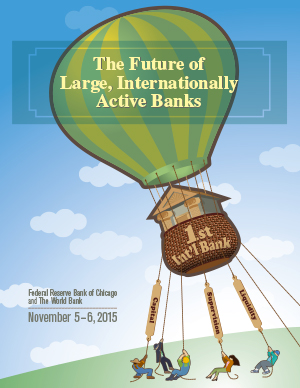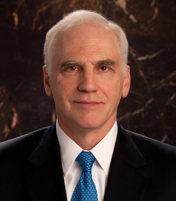Eighteenth Annual International Banking Conference

The Future of Large, Internationally Active Banks
The Federal Reserve Bank of Chicago held its annual International Banking Conference on November 5–6, 2015. This topic was The Future of Large, Internationally Active Banks, and the event was co-sponsored by the World Bank. The purpose of the conference was to identify and address important issues currently affecting international financial markets and institutions. The conference was held at the Federal Reserve Bank of Chicago Conference Center.
The Great Financial Crisis of 2007–10 had a major impact on large cross-border banks, which are widely blamed for the start and severity of the crisis. As a result, much public policy, both in the United States and elsewhere, has been directed at making these banks safer and less influential by reducing their size and permissible powers through increased government regulation.
The conference discussed topics such as: the current regulatory landscape for large and internationally active financial institutions; the impact of regulation on bank permissible activities and international trade; improvements in risk management; necessary repairs to the bank safety net; the resolution of insolvent banks operating across national borders; corporate governance for banks in the new environment; implications for market and government discipline; and progress in achieving international cooperation.
Conference participants explored how these issues are addressed in the Dodd–Frank Act of 2010 and in international regulatory reform programs. How does the bank "single supervisory mechanism," led by the European Central Bank, address these issues? What lessons can we draw from the changes in bank operations to date? What additional changes can we expect? Are internationally active banks “too-big-to-fail?” Is the definition of “systemically important” institutions, which require enhanced prudential regulation, appropriate or too broad?
These important public and private policy issues were discussed by international policymakers, practitioners, researchers and academics from more than 30 countries over the two-day conference. In addition, the conference featured three keynote speakers. If past conferences are any indication, many of the ideas raised at the conference are likely to be the policy reforms addressed in the near future.

Thomas M. Hoenig was confirmed by the Senate as vice chairman of the Federal Deposit Insurance Corporation on November 15, 2012. He joined the FDIC on April 16, 2012, as a member of the FDIC Board of Directors for a six-year term. He is a member of the executive board of the International Association of Deposit Insurers.
Prior to serving on the FDIC board, Hoenig was the president of the Federal Reserve Bank of Kansas City and a member of the Federal Reserve System's Federal Open Market Committee from 1991 to 2011.
Hoenig was with the Federal Reserve for 38 years, beginning as an economist and then as a senior officer in banking supervision during the U.S. banking crisis of the 1980s. In 1986, he led the Kansas City Federal Reserve Bank's division of bank supervision and structure, directing the oversight of more than 1,000 banks and bank holding companies with assets ranging from less than $100 million to $20 billion. He became president of the Kansas City Federal Reserve Bank on October 1, 1991.
Hoenig is a native of Fort Madison, Iowa. He received a doctorate in economics from Iowa State University.

Daniel K. Tarullo took office on January 28, 2009, to fill an unexpired term ending January 31, 2022.
Prior to his appointment to the Board, Tarullo was Professor of Law at Georgetown University Law Center, where he taught courses in international financial regulation, international law and banking law. Prior to joining the Georgetown Law faculty, Tarullo held several senior positions in the Clinton administration.
From 1993 to 1998, Tarullo served, successively, as Assistant Secretary of State for Economic and Business Affairs, Deputy Assistant to the President for Economic Policy and Assistant to the President for International Economic Policy. He also served as a principal on both the National Economic Council and the National Security Council. From 1995 to 1998, Tarullo also served as President Clinton's personal representative to the G7/G8 group of industrialized nations.
Before joining the Clinton administration, he served as Chief Counsel for Employment Policy on the staff of Senator Edward M. Kennedy, and practiced law in Washington, D.C. He also worked in the Antitrust Division of the Department of Justice and as Special Assistant to the Undersecretary of Commerce. From 1981 to 1987, Tarullo taught at Harvard Law School.
Tarullo has also served as a senior fellow at the Council on Foreign Relations and as a non-resident senior fellow at the Center for American Progress. Tarullo has also held a visiting professorship at Princeton University.
Tarullo received his A.B. from Georgetown University in 1973 and his M.A. from Duke University in 1974. In 1977, Tarullo received his J.D. (summa cum laude) from the University of Michigan Law School, where he served as Article and Book Review Editor of the Michigan Law Review.

He has been on the faculty at New York University since 1970. From 1971 to 1979 he was vice dean for academic affairs and subsequently served a number of terms as Chair of International Business and Chair of Finance. Subsequently he was director of the New York University Salomon Center for the Study of Financial Institutions from 1990 to 2003 and director of the Stern Global Business Institute from 2003 to 2006. He served as vice dean of faculty at Stern from 2008 to 2012.
Walter has had visiting professorial appointments at the Free University of Berlin, University of Mannheim, University of Zurich, University of Basel, the Institute for Southeast Asian Studies in Singapore, IESE in Spain and various other academic and research institutions. He held a joint appointment as professor of international management at INSEAD in Fontainebleau, France from 1986 to 2005 and remains a visiting professor there.
Walter's principal areas of academic and consulting activity include international finance and banking. He has published papers in most of the professional journals in these fields, and is the author, co-author or editor of 26 books, including Mergers and Acquisitions in Banking and Finance - What Works, What Fails and Why? (New York: Oxford University Press, 2004), Governing the Modern Corporation (New York: Oxford University Press, 2006), Regulating Wall Street (New York: John Wiley & Sons, 2011) and Global Banking 3rd Edition (New York: Oxford University Press, 2012).
Walter received his A.B. (summa cum laude) and M.S. degrees from Lehigh University and his Ph.D. degree from New York University. He has served as a consultant to various corporations, banks, government agencies and international institutions, and has held a number of board memberships.










